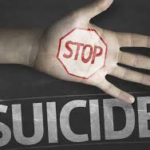
The Association for Suicide Prevention Ghana (GASP) has called on the government and stakeholders to invest in mental health to improve the well-being of people and reduce morbidity and mortality associated with suicide.
The Association made the call as Ghana marks this year’s World Suicide Prevention Day (WSPD) on the theme “Changing the Narrative.”
The theme for the 2025 World Suicide Prevention Day (WSPD) is in its second year, as it was chosen by the World Health Organization (WHO) and the International Association of Suicide Prevention (IASP) as a triennial celebration theme for 2024, 2025, and 2026.
The triennial celebration theme seeks to raise consciousness across the globe about the epidemic of suicide and to challenge harmful myths, reduce stigma, and foster open, compassionate conversations about suicide.
A statement issued by the GASP and copied to the Ghana News Agency said Ghana ranked high among nations that had taken bold initiatives to address suicidal behaviour due to its recent repeal of the laws criminalizing suicide attempts.
The Association said that despite the effort, stigmatisation, social exclusions, and cultural taboos continue to affect people experiencing suicidal crises, which prevents them from seeking help.
“Suicide is preventable, and evidence abounds that persons with suicidal intent who seek help get better and can go on to lead normal lives,” the statement said.
The global call to change the narrative means driving systemic change that will make suicide prevention and mental health become priority areas in public policy,” the statement added.
“Changing the narrative” is about shifting from silence and misunderstanding to openness, empathy, and support, creating environments where people feel able to speak up and seek help,” it emphasised.
The GASP said the pervasive stigma and silence of suicide within and across nations continued to hinder open discussion about the topic, cutting-edge research, identification and prevention of risk factors, and disclosures of suicidal intent for professional support.
The Association indicated that the call to action involved developing and implementing evidence-based strategies, improving access to quality care, and ensuring that those in distress received the support they needed.
“Research continues to reveal underlying mental health challenges such as depression, anxiety, and stress alongside sociocentric factors including poverty, interpersonal and romantic relationship conflicts, oppression, marginalization, and cultural or religious influences, all of which contribute to an increased risk of suicide in the general population.”
The GASP identified that Parent-child conflicts, poor academic performance, lack of reasons for living, meaninglessness, substance use and misuse, gambling and pornographic addictions, and excessive and unregulated screen time, among others, have been linked to suicide among children and young people.
“Suicide is the third cause of death among 15–29-year-olds globally, and more than 720,000 people take their lives annually around the world. Africa records the highest rate of suicide (11.5 per 100,000 people) compared to other regions of the world and the global average of 8.9 suicides per 100,000 people,” it said.
The statement indicated that recent WHO estimates suggested that in Ghana, 8.1 persons per 100,000 people died by suicide in 2021, saying, “suicide is not only a personal, family, and community problem; it is also an economic challenge.
The GASP estimated that a death by suicide costs an average present value of 92,576 dollars per year, an imperative for African Governments, particularly Ghana, to prioritise suicide prevention generally among adolescents and young adults, specifically through the development of comprehensive suicide prevention policies.
GASP is a non-governmental, non-profit-making organization of professionals committed to suicide prevention in Ghana, committed to driving the change in the narrative locally.
As part of its local efforts, GASP is working closely with major stakeholders, including the WHO Ghana Office, LifeLine International, and media personnel, to develop locally sensitive guidelines for changing the narrative through responsible suicide reporting.
“Let’s all work together to change the narrative to prevent suicides. Suicide prevention is everyone’s business,” it said.